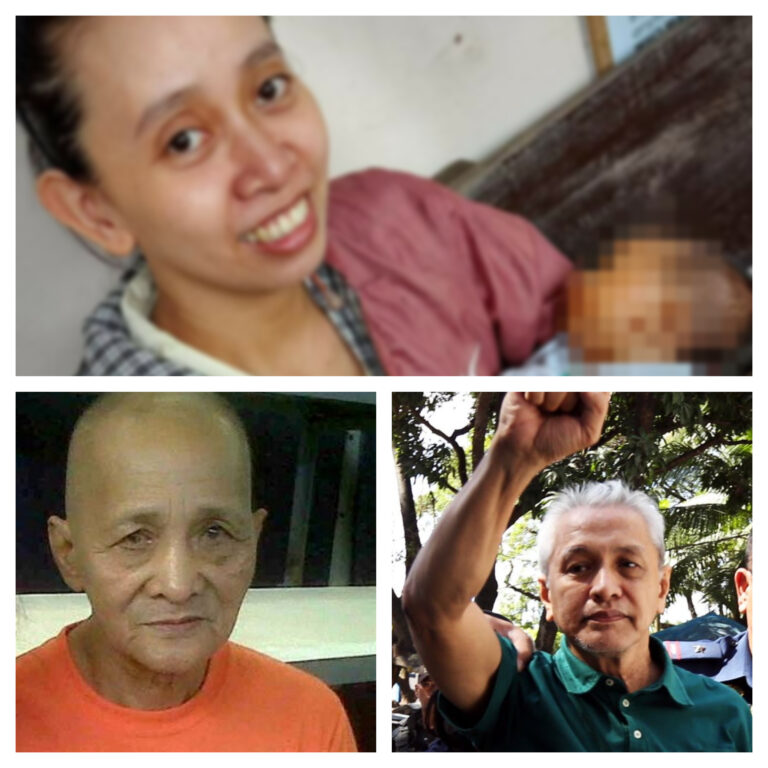
Filipino Heritage Month inspires us to know and understand our history as a people, because part of being “Proud to be Pinoy” is embracing our history. There is no argument — Filipinos are one of the best, if not the best, in singing, dancing, and acting. We shine as health workers and caregivers. We are very hard-working. We are generous and hospitable to a fault.
More important than this is the truth that as a people, we belong to the glorious lineage of brave men and women who fought for freedom and independence throughout our history, regardless of age, social class, ability, gender, religion, and origin. And thousands of them were political prisoners and prisoners of war.
There is National Hero Dr. Jose Rizal and Tandang Sora, arrested and imprisoned by the Spanish colonial regime and Apolinario Mabini, revered as the “Brains of the Philippine Revolution,” imprisoned during the American occupation. They were the political prisoners at this period in our history, along with many others.
Playwright Aurelio Tolentino was among those punished for embracing Filipino nationalist sentiments during the US colonial occupation, such as displaying the Filipino flag, writing patriotic literature, and organizing performances. In the 1930s, peasants and workers organized a Labour Day march which the US colonial government attacked, and many were arrested. When the Japanese attacked and invaded the Philippines, the Japanese arrested and tortured thousands of Filipinos as prisoners of war.
The US declarations of “liberation” and the “grant of independence” (1946 onwards) were deliberately tied to economic and military treaties to ensure U.S. presence and domination over the new neo-colony. Nationalist sentiments never waned. Political arrests and detentions continued, and one of the most prominent political prisoners then was Amado V. Hernandez, journalist, trade union leader, and writer. He was posthumously honoured as National Artist for Literature in 1973.
Political prisoners then were called, among other pejoratives, filibustero, insurecto, ladron, insurgents by the Spaniards and the Americans.
Under the Marcos dictatorship (1965-1986) over 50,000 people were arrested and detained, among whom were Sister Mariani Dimaranan, Jose Maria Sison, Fidel Agcaoili, Satur Ocampo, Benigno Aquino, Crispin Beltran, Senator Jose Diokno, and other church workers, lawyers, human rights defenders, youth and students, labour leaders, journalists, and peasants.
All post-Marcos Sr governments have continued to arrest and detain its citizens and residents.
Political prisoners were called public order violators, national security offenders, rebelde, and criminals, and lately, terrorists, leftists, murderers, communists. This malicious practice of criminalization of political offenses takes away the political nature of their imprisonment and deprives them of their rights as political prisoners.
Political prisoners are the living evidence of the continuing repression of the Filipino people, and the people’s continuing resistance.
There are 824 recorded political prisoners all throughout the Philippines now. Their common binding thread is their desire to better their conditions of life, defend their rights and dignity, and uphold the people’s national freedom and democracy. Gerardo dela Pena (Tatay Gerry) at 84 years is the oldest. Randall Emmanuel Echanis at 2 years is the youngest; he was one month old when he was arrested together with his mother Amanda Echanis. Many of the prisoners are elderly and sickly. Majority are peasants, urban poor, and workers. A number are peace consultants of the National Democratic Front whose safety and immunity guarantees have been violated. Political prisoners have been charged with criminal offenses which are non-bailable. Their rights as prisoners to health, to life, and against cruel, degrading, or inhuman punishment, like substandard prison conditions, have been ignored, violated, and disrespected.
The families and friends of political prisoners under the support group of KAPATID continue to campaign for their release and for better prison conditions, visiting rights, access to medical care, and other rights as prisoners. It is hoped that the extraordinary legal remedy called the Writ of Kalayaan will soon be institutionalized by the Philippine Supreme Court so that political prisoners who are in extreme need for relief, given the appalling and poor prison conditions and the prisoners’ health, can be released.
Where there is repression, impunity, and wanton disregard for human rights, there will be political prisoners. Filipinos are not a subservient people, easily cowed and content with scraps and crumbs thrown across the table. We belong to a glorious and militant lineage of fighting men and women. History gives us their stories. Political prisoners stand before us, they are the living evidence of continuing repression, and the people’s continuing resistance.
